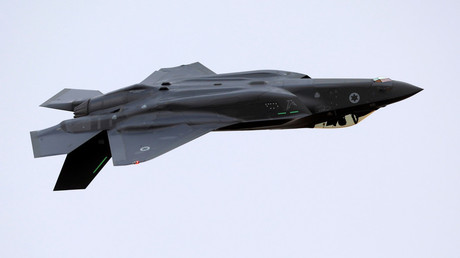US to send Israel more F-35s after Moscow supplies S-300s to Syria – reports
The US will reportedly provide Israel with more F-35s after Russia supplied Syria with S-300 missile systems. Moscow’s move came in response to the downing of a Russian military plane, which it partly blamed on Israel.
US President Donald Trump decided to lend a hand to America’s most devoted ally following consultations at the“highest administration and military levels,” DEBKAfile, a military intelligence news site, said to have ties with the Israeli security services, reported.
The move to increase Israel’s weapon arsenal was taken in the wake of Russia’s “enhanced threat” and its decision to deliver S-300 air defense systems to the war-ravaged country, according to the report. The precise number of aircraft destined for Israel, however, has not been disclosed.
It is also understood that Prime Minister Benjamin Netanyahu, crown princes Mohammed bin Salman of Saudi Arabia and Muhammad bin Zayed of the United Arab Emirates, were informed of Trump's decision.
The F-35 stealth multirole fighters in question will be deployed from the US Air Force’s active service squadrons, the report said. The first squadron will be posted at the UAE Al Dhafra Air base, some 32 kilometers (19 miles) from Abu Dhabi.
DEBKA concludes that “this massive transfer” indicates the allies “determination” to maintain Israeli operations in Syria, “notwithstanding the presence of the S-300s and boosted Russian-Syrian air defense capabilities.”
The report comes on the heels of the downing of the Russian Il-20 jet by Syrian air defense forces. Moscow pinned the blame on Tel Aviv, saying its data proved that the Israeli F-16 fighter jet was trying to use the Russian aircraft as a shield. Israel has denied the accusations.
Responding to the incident, Russia sent S-300 air defense system to Syria to boost security of its personnel and prevent potential further escalations. The delivery – initially planned years ago – was halted in 2013 on an Israeli request, but the September events forced Moscow to change its mind.
Damascus, for its part, views Israeli strikes which have intensified since the start of the year as a violation of the nation's sovereignty, arguing that they only help terrorists.
The US, Israel’s long-time friend, didn’t miss a chance to criticize the S-300s deployment. The head of the US Central Command, General Joseph Votel, called the move a “needless, needless escalation,” noting that the Russian hardware would not affect US military activities in the region.
Israel, which remains committed to striking Iranian linked targets in Syria, found the deployment of Russian arms as “problematic.” The country's energy minister Yuval Steinitz, for instance recently acknowledged that the S-300 “is a system which certainly makes things difficult for us and requires that solutions be found.” However, national security expert Tzachi Hanegbi boasted that the stealth capabilities of the F-35s can’t be detected by S-300s.
Notably, the stealth fighter continues to be plagued by various faults, including malfunctions of the oxygen-supply system. In 2017, a Pentagon report revealed the jet had more than 270 deficiencies, ranging from software trouble to structural problems.
Beirut-based journalist Martin Jay believes that Russia’s S-300 delivery shows Israel who’s in charge and is not aimed at open confrontation. “I think all bets are off now. Russia is showing Israel who is in charge and that it won’t take any more nonsense,” he told RT.



0 Comments:
Post a Comment
Subscribe to Post Comments [Atom]
<< Home